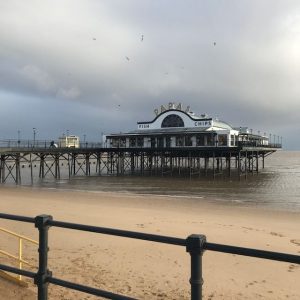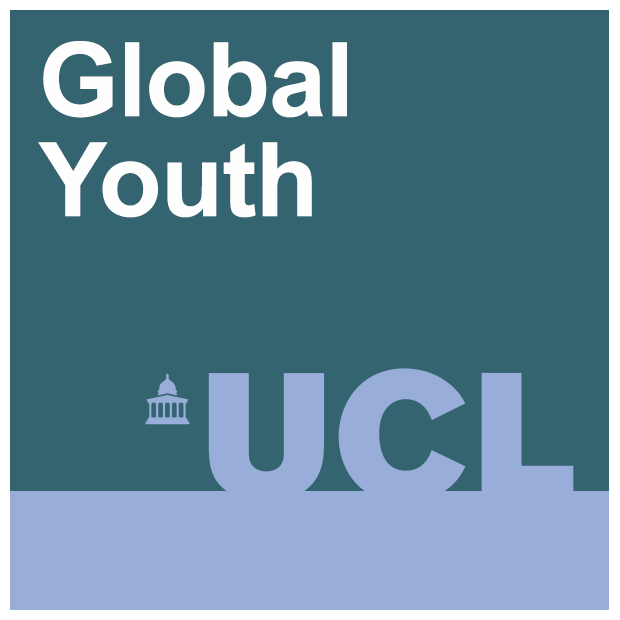Guest post by Dr Rachel Benchekroun (UCL IOE) and Pippa Curtin (Voice and Influence Co-Ordinator, Young Advisors, North East Lincolnshire Council)
What did we set out to achieve?
Coastal towns present unique challenges and opportunities for their young residents. The aim of the co-production strand of our recent research project was to work with young researchers to explore how growing up in a coastal town shapes young people’s aspirations, how they feel about their coastal town, and how they think it can be improved. Following a pilot project in Margate, project lead Avril Keating and research assistant Rachel Benchekroun at UCL wanted to work with a group of young people in North East Lincolnshire to enable them, as young researchers, to interview their peers and older people to find out more. We wanted to work together to develop innovative arts-based and place-based methods to use in the interviews. 
Our existing relationship with national organisation Young Advisors was a strong base for developing a partnership with Young Advisors in North East Lincolnshire, led by Pippa Curtin, the NE Lincs Voice and Influence Coordinator. This project was an exciting opportunity for the Young Advisors in NE Lincolnshire to get involved in a national project on behalf of their organisation. Using their skills, knowledge and contacts, the young people were keen to gain insights into past and present experiences of what it’s like to grow up in a coastal community. They would also have the opportunity to advise on the use of peer research methods and develop new research skills. Not least, it was a chance to work with a university to showcase their local area and the voices of young people.
What did we achieve?
Through regular communication and positive collaboration, a strong partnership was developed between Young Advisors as a national organisation, the NE Lincolnshire team and the UCL researchers. The Young Advisors tested out the interactive methods as participants, and made significant contributions to their design before conducting their own interviews. They developed new strategies along the way, drawing on their experiences to shape the research project, and worked with Rachel to review the methods as the fieldwork progressed. Young Advisors’ innovations included trying out the interactive methods with older interviewees as well as peers; interviewing a couple in a paired interview, rather than one-to-one; and helping a young interviewee feel more comfortable with the interactive methods by engaging in the activities in parallel.
Through interviews and reflective workshops, the Young Advisors shared with Rachel their knowledge of their coastal community, and their views of the opportunities and challenges, and what they would change. They also drew on their personal networks to recruit and interview peers and older people, enabling young and older residents from a range of backgrounds to share their reflections and ideas about their local area with a view to informing future developments in the area. The data the Young Advisors generated through their dual roles as participants and researchers were invaluable in helping to address the project’s research questions.
What have we learned about co-production?
There was significant learning for all of us. The Young Advisors enjoyed finding out about their interviewees’ views of their town, identifying patterns and differences in responses:
I liked how you can see how people’s views are very similar even if they grew up on different sides of the town […] but then also very different as well.
The best thing was just hearing different views [from] old people experiencing different things to us.
Although experienced in carrying out consultations in their town, this was the Young Advisors’ first experience of undertaking social research for a project with a university. Through a combination of training workshops, first-hand experience and reflective group sessions, the Young Advisors learned about research ethics and the practical challenges of planning and undertaking fieldwork. Over the duration of the fieldwork, the Young Advisors developed their confidence and skills in building rapport with their interviewees, following the interview schedule, and simultaneously being sensitive to the natural flow of the conversation and responding with effective ‘prompt’ questions. These research skills and wider interpersonal skills are likely to be an asset in the Young Advisors’ future work and education opportunities.
What were the challenges and how did we address them?
Finding a balance between the requirements of a university-initiated research project and the needs of the Young Advisors was an ongoing challenge. For example, university requirements for us to use comprehensive information sheets and consent forms to obtain informed consent – necessary for ethical approval – meant that, despite our best efforts, these documents were wordy and long. This created problems for the Young Advisors, both as participants and as researchers having to explain terminology to their interviewees. Sometimes the consequences were counter-productive: “with the consent form […] my young person just did yes for everything. They didn’t even read the question. It was yes, yes, yes.”
Another university requirement was to provide details of our planned research methods in order to obtain ethical approval before starting the fieldwork. As with the informed consent process, this is normal in the academic world, but for us this approach had to be balanced with the need to be open to the Young Advisors’ ideas and suggestions – an important aspect of co-production.
Further challenges encountered by the Young Advisors included an initial lack of familiarity with the interview schedules and difficulty finding suitable times and locations for interviews (resulting in some interviews being cut short). Ill health posed a challenge in recruiting Young Advisors, especially given the context of the pandemic, although Pippa was able to bring other team members on board. Tight timescales made it difficult for Young Advisors to arrange interviews with all of their potential participants. Working in partnership with clear and regular communication between UCL, the Young Advisors team lead and the young people themselves helped to manage the timescales. Covid-19 restrictions and the young people’s other commitments made it difficult at times for everyone to meet up in the same room, but when this was not possible, hybrid meetings were held using online platforms.
How will our learning about co-production shape our co-produced research in the future?
The project highlighted how essential the ‘behind-the-scenes’ support from Young Advisors NE Lincolnshire was at all stages of the project. As well as providing invaluable information about the local area, Pippa and her colleague played a vital role in organising the meetings, liaising with the Young Advisors, providing all kinds of support and advice, suggesting solutions and general troubleshooting! Without this support and regular communication, the project would not have been possible.
Moving forward into the next iteration of the project, we want to centre the values of co-production. We’ll engage with the Young Advisors by finding out about their hopes and expectations, prioritising an approach of ‘working with’ rather than what will generate the best data. We also want to make our research more accessible at all stages and for everyone – and we believe we can do this by thinking in a young person-centred way.
As part of this, we plan to review the information sheet and consent form with the university ethics panel to find ways to make these shorter, simpler and more accessible, without losing essential content. We also intend to make the workshops more interactive, building on Young Advisors’ existing skills and experience, and will be open to doing things differently. We want to build in more time for the Young Advisors to develop and pilot innovative interactive methods, role play the interviews, and reflect deeply on what works and what they would change. We’ll make every effort to run all of the workshops in person, to help build strong relationships. In the next iteration of the project, we will benefit from peer learning by bringing together new participants with Young Advisors who were involved as researchers in the earlier project.
We’ll allow more time for fieldwork, ideally including both term-time and school/college holidays to maximise opportunities to organise interviews. Rather than putting the onus on the Young Advisors to find suitable locations for interviews, we’ll provide quiet, safe spaces in a public or community building for them to use. We’ll make sure that one or both of us will be on site to provide support and advice as needed, and to check in with each Young Advisor after each interview, to reflect together on what went well and what might work better next time.
We’ll also plan more reflective group sessions both during the fieldwork stage and afterwards, to ensure the Young Advisors are fully involved in analysis of the data, planning and developing accessible and interactive research outputs, and sharing key findings locally, regionally and nationally. We want to make sure that any promotional materials and reports produced are young person-friendly in their presentation and language by asking Young Advisors from the marketing team to design them. We want to ensure the Young Advisors are front and centre in taking the findings to policymakers and other stakeholders. It will be important for the Young Advisors – and their interviewees – to see the impact of the research.
Implementing this learning will help us ensure that young people are at the heart of decision making and helping to change their community – in accordance with the principles of the Young Advisors movement. It will also help us to build an even stronger partnership between Young Advisors and UCL, and produce high quality research which will shape policy and practice at local and national levels.
Filed under Co-production, Coastal youth
Comments Off on Researching with young people in coastal towns: What have we learned about co-production with young people?
 Close
Close






